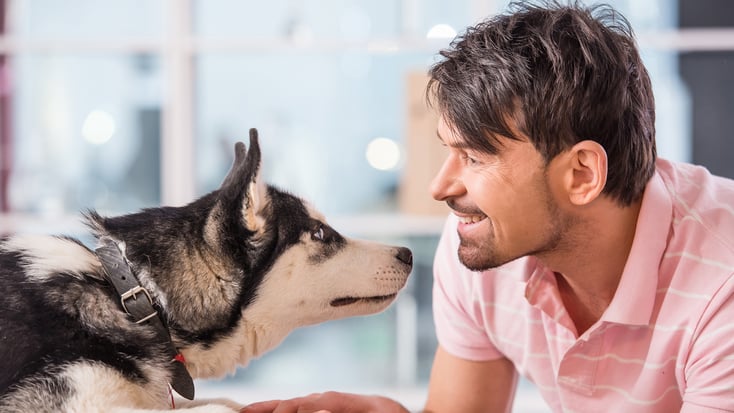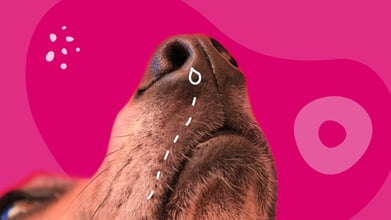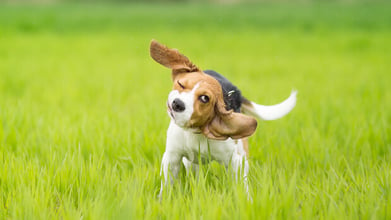Why Does My Dog Stare At Me? 5 Common Reasons

Table of Contents
Have you ever wondered why your dog stares at you? Dogs communicate with humans in their own special way. Eye contact is an important part of this communication. Understanding why your dog stares at you can help you strengthen your bond and address any underlying issues.
Dogs stare at their owners for various reasons, and it can have different meanings depending on the context and the dog's body language. Here are some common reasons why dogs stare at their owners:
1. Your dog wants something
Dogs may stare because they want something from their human parents, perhaps to play or to go outside. They might also be asking you for food or wanting what you're eating. They stare because they're used to getting what they want through staring.
2. Your dog loves you
Dogs may also express affection through eye contact and a loving gaze, as humans do. Interactions between you and your dog, such as gazing and petting, can stimulate oxytocin for both of you. Oxytocin is a hormone that causes us to feel loved and can lower stress levels.
A dog who stares at you while wagging their tail and relaxing their body is telling you they love you. Looking directly into their eyes shows them you love them too.
3. Your dog is observing you
Our furry friends rely on gestures, verbal instructions, and facial expressions to communicate with us. If your dog is staring at you, it means you have your dog's attention.
They might want to know what you want them to do, what you're thinking, or what you're feeling. Dogs can read our emotions which is why some breeds can serve as emotional support pets.
4. Your dog needs you for protection
If you find yourself asking, "Why is my dog staring at me while they are pooping?" you're not alone. Dogs feel vulnerable and let their guard down when doing their business. They look at you because they trust you'll protect them from danger.
5. Your dog is angry
Angry dogs do a "hard stare" with enlarged pupils, pinned ears, lowered heads, and a stiff posture. It might happen with random dogs, but if your pet shows sudden aggression, step back first and let them calm down.
Addressing Unwanted Staring Behavior
Dogs learn to make things happen through their actions, including staring. It's important to prevent your dogs from developing unwanted behavior.
Here are some tips:
- Prevent your dog from developing unwanted behavior by not reinforcing staring for rewards, particularly when it comes to food.
- Avoid engaging in unblinking eye contact with unfamiliar or angry dogs, as they may perceive it as a challenge.
- Observe your dog's body language to determine the reason for staring and take appropriate action to prevent escalation.
Should My Pet Be Seen by a Veterinarian?
1. Have you noticed changes in your pet’s appetite?
2. Does your pet have diarrhea or loose stools?
3. Have you noticed changes in your pet’s thirst/water consumption?
4. Is your pet having accidents in the house?
5. Is your pet pacing and unable to settle?
6. Is your pet panting more than usual?
7. Is your pet whining or vocalizing more than usual?
8. Is your pet shaking more than usual?
9. Is your pet hiding or avoiding physical contact more than usual?
10. Is your pet more lethargic and sleeping more than usual?
11. Are you concerned about changes in your pet’s behavior?
12. Is your pet scratching their ears?
13. Is your pet licking their paws more than usual?
14. Does your pet have a rash?
15. Is your pet moving more slowly than usual or having a harder time getting up or down?
View Results
Should My Pet Be Seen by a Veterinarian?
1. Have you noticed changes in your pet’s appetite?
2. Does your pet have diarrhea or loose stools?
3. Have you noticed changes in your pet’s thirst/water consumption?
4. Is your pet having accidents in the house?
5. Is your pet pacing and unable to settle?
6. Is your pet panting more than usual?
7. Is your pet whining or vocalizing more than usual?
8. Is your pet shaking more than usual?
9. Is your pet hiding or avoiding physical contact more than usual?
10. Is your pet more lethargic and sleeping more than usual?
11. Are you concerned about changes in your pet’s behavior?
12. Is your pet scratching their ears?
13. Is your pet licking their paws more than usual?
14. Does your pet have a rash?
15. Is your pet moving more slowly than usual or having a harder time getting up or down?
Share Quiz
Conclusion
Dogs stare to express their affection, to get what they want, to learn more about you, or because they're angry. As a pet parent, it's your job to be observant and understand why your pet does this. As a result, you'll bond better with them and can address any underlying serious issues such as aggression or health problems.
If your dog's body language says something is wrong, don't hesitate to contact your vet for a consultation. They can inform you of the best approach.
Frequently Asked Questions
Do dogs like eye contact?
This can vary depending on the situation. Dogs are happy to release oxytocin when making eye contact for affection and need, while eye contact in times of threat can irritate dogs.
Should you look a dog in the eyes?
Eye contact can strengthen your bond with your dog. But don't do it when your dog is angry or with a strange dog, as it may look as though you're challenging them.
Why do dogs watch you eat?
They want your food! Although you love sharing human foods, you shouldn't encourage this behavior. This may lead to obesity and unwanted behaviors. Instead, train your dog not to do this with positive reinforcement.
Why does my dog stare at me and whine?
Dogs may stare at you to try to call for your attention or beg by whining.
Why does my dog stare at me without blinking?
This is usually a sign of aggression. If your pet does this often, seek in-home pet behavior counseling to determine why this aggression is occurring.






